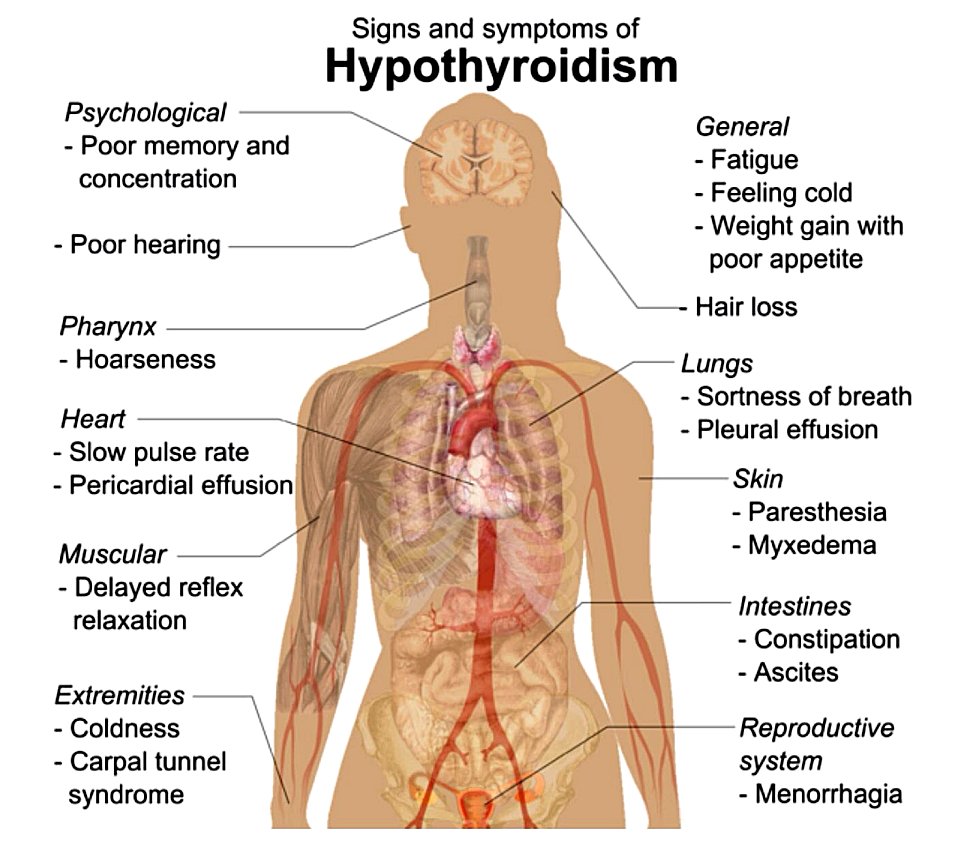Hypothyroidism
For now, we will concentrate on hypothyroidism and how this condition impacts your health.
When for any reason, there’s not enough thyroid hormone released by the thyroid, the body’s metabolic function slows down. This, in turn, leads to a hefty weight gain or difficulty in losing weight and general fatigue. The most common condition of hypothyroidism is Hashimoto’s Thyroiditis, which is an autoimmune condition that might be fixed through surgery.
In truth, hypothyroidism presents very obvious but vague symptoms, so it’s very easy to miss the diagnosis. The first presenting symptoms usually affect your emotions and metabolism. You may notice fluctuations in your mood that are out of character for you and you also start to consistently gain weight.
The next thing you may notice is never ending fatigue that you just can’t explain. You then may start to notice thinning hair, joint pain, brain fog or memory impairment and sensitivity to cold.
If you experience any of these on a regular basis, it’s advisable that you book an appointment with your doctor and request to have your thyroid checked.
Symptoms of Hypothyroidism (Inactive Thyroid)
- Never ending fatigue
- Mood swings
- Blurred vision
- Weight gain
- Weakness
- Muscle aches and cramping
- Sleepiness
- Loss of hair
- Constipation
- Sensitivity to cold
- Swelling in legs
- Lower perspiration
- Irritability
- Oscillating blood pressure levels
- Forgetfulness
Symptoms of Hyperthyroidism (Overactive Thyroid)
- Increased sweating
- Diarrhea or frequent bowel movement
- Heart palpitations
- Insomnia
- Appetite changes
- Irritability
- Heat intolerance
What Causes the Thyroid To Slow Down?
The most common cause of a slow thyroid is an autoimmune condition. Your body’s immune system is responsible for protecting you from bacterial, viral and any foreign invasion.
If you have autoimmune hypothyroidism, your immune system starts fighting your thyroid gland. This impairs your thyroid function and leads to reduced secretion of thyroid hormones. The most common autoimmune condition is the Hashimoto’s thyroiditis.
Other common causes of hypothyroidism include:
- Removal of the thyroid
This could be partial or complete. When a part of your thyroid is removed for medical reasons, the remaining portion stops working optimally, and this could lead to hypothyroidism. - Medication-induced hypothyroidism
Some medication may inhibit your thyroid gland from secreting enough thyroid hormone. It’s advisable to find out from your doctor if any medication you are on could lead to hypothyroidism. - Iodine imbalance
The thyroid gland regularly needs a supply of iodine to produce thyroid hormone. An imbalance can lead to hypothyroidism. Though iodine deficiency is rare because it is supplemented in salt, it’s important you get enough iodine from dietary sources such as beef, chicken, dairy, fish and pork. - Drinking tap water
We all know that you should be drinking water throughout the day to not only stay hydrated but to reap the other life-changing benefits such as reducing heart attack and diabetes risk, firmer skin, less wrinkles, increased energy and weight loss.
However, a large percentage of tap water contains fluoride. While this may be great for your teeth, it depletes iodine in the body and this causes the thyroid to slow down. So if your daily water intake is coming from the tap or bottled water that contains fluoride, it may be impacting your thyroid. - The dysfunction of the pituitary gland
This gland works hand in hand with your thyroid by telling it how much thyroid hormone to secrete. If the pituitary gland malfunctions, this can lead to inadequate production of the thyroid hormone. - Stress and toxins
Factors such as food intolerances, toxins, sugar highs and lows can trigger your hormonal system to release more stress hormones. This can inhibit enough production of thyroid hormone therein leading to hypothyroidism.
To continue, see: 7 Ways to Heal Your Thyroid
[PC-Popup id=7]
